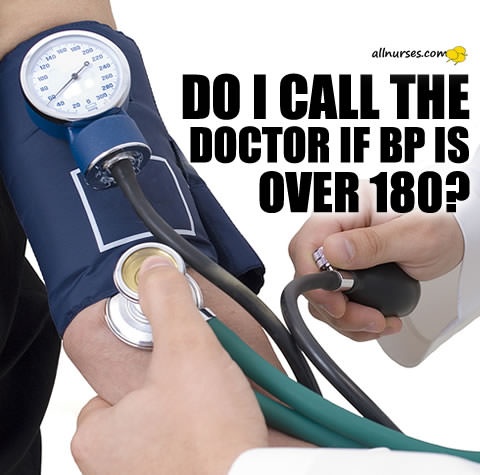- Community
-
Programs
- Schools
-
Careers
- RN Specialties
- Best RN Jobs and Salaries
- Aesthetic Nurse
- Nursing Informatics
- Nurse Case Manager
- NICU Nurse
- Forensic Nurse
- Labor and Delivery Nurse
- Psychiatric Nurse
- Pediatric Nurse
- Travel Nurse
- Telemetry Nurse
- Dermatology Nurse
- Nurse Practitioner
- Best NP Jobs and Salaries
- Family NP (FNP)
- Pediatric NP
- Neonatal NP
- Oncology NP
- Acute Care NP
- Aesthetic NP
- Women's Health NP
- Adult-Gerontology NP
- Orthopedic NP
- Emergency NP
- Psychiatric-Mental Health NP (PMHNP)
- APRN
- Nurse Educator
- Nurse Administrator
- Certified Nurse Midwife (CNM)
- Clinical Nurse Specialist (CNS)
- Certified Registered Nurse Anesthetist (CRNA)
- Resources
- Education


SarHat17, ASN, RN
58 Posts
@MunoRN
I think this could get sticky, depending on the context and interpretation. (I'm not referring to current treatment trends of BP in the hospital.) Using my clinical judgement to call on a patient with an "elevated" BP to let the Dr evaluate whether treatment is warranted or not is completely appropriate within my scope of care and policies/standards on my unit/at my hospital, especially if there are no parameters or PRNs ordered.
Your statement almost reads like nurses are the ones overtreating the patient, which isn't how it works. If there are ordered parameters and PRNs, they are ordered by a Dr for a reason. If I ask for more clarification regarding WHY we are using those parameters, etc, that would be appropriate, but to put the "blame" on nurses who are calling to update the Dr on the current VS and status of their patient and then administering the medications ordered is inappropriate.
Maybe just the way it was worded, but your post didn't sit right with me. If I misread, please help me understand!